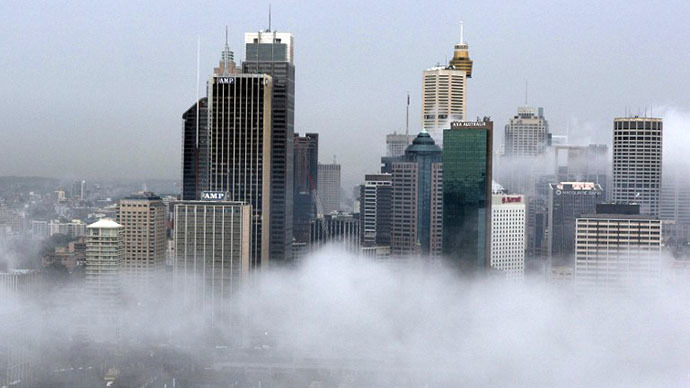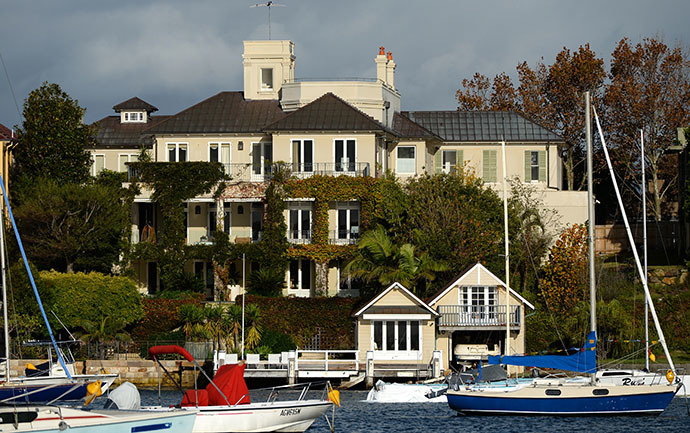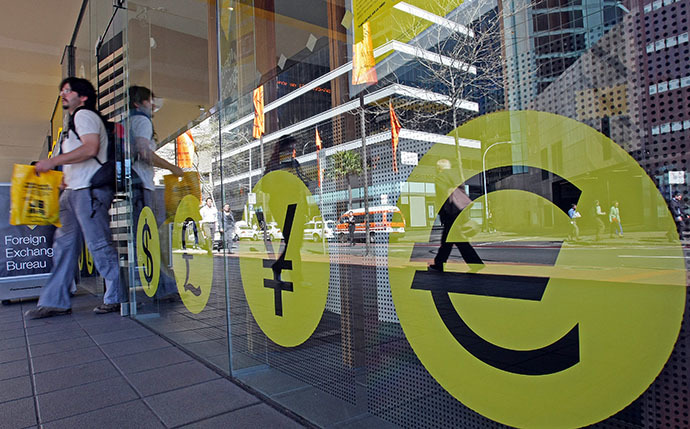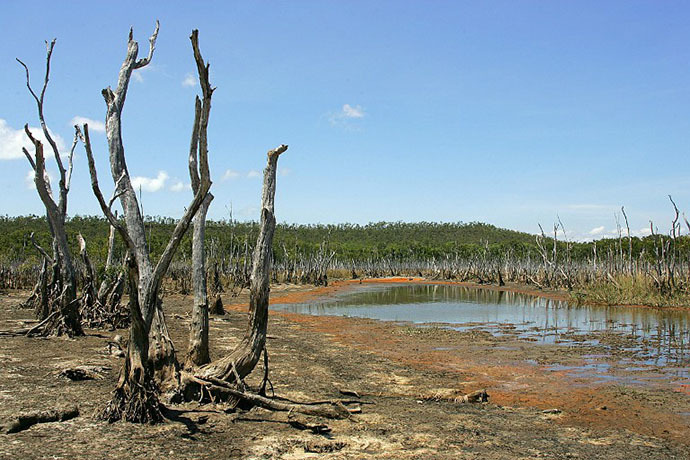‘Boom’-erang at point of no return? Australian economic boom ending

A common misconception about lemmings is that they commit collective suicide during migration. Fuelled by a 1958 Disney film called White Wilderness, stage-trickery gave the impression that the rodents jumped to their deaths off cliffs.
In reality, the producers (who won an Oscar) launched the helpless creatures off a turntable to their demise in order to fuel a myth and presumably give the audience what they wanted to see.
The same principle is frequently applied to economics during boom cycles by local mainstream media in whichever nation the apparent economic growth is taking place.
Instead of responsibly using their influence to warn the populace that the prosperity mightn't be solid, the media generally become the chief cheerleaders for the bubble, serving to inflate the percolation even more. Frequently, they even try to make the boom look 'boomier' by comparing salaries/property-prices in their country to another nation which has historically been wealthier, but is on a more regular and sane economic path at the point in time.
There are myriad reasons for this phenomenon. Sometimes, media-proprietors need 'confidence' to keep other businesses they may own on a 'growth path' and often individual editors, dizzy as their house price keeps rising and creates paper-wealth, block dissent in order to maintain the feel-good factor. There is also the commercial imperative that advertisers may baulk if the media-outlet is considered to be 'too negative' and the fact that huge revenue streams can be tapped, particularly by newspapers, during a housing bubble via property advertising.

Indeed, it is often the case that property supplements become larger than the actual core newspaper itself meaning that the lines between what is reportage and what is advertorial become completely blurred.
I do not have much experience of lemmings, but I have copious amounts of it when it comes to living in a bubble economy. You see, I came of age in Ireland during what was known as the 'Celtic Tiger' and worked in the mainstream Irish media at a time when those who urged caution were marginalized and ostracized.
Six years after the 'Tiger' crashed, Ireland is still picking up the wreckage of that era and other parts of Europe such as Spain and Greece haven't even stooped yet to gather their flotsam. Now I think a fresh 'rich' country is about to crash and it's on the other side of the world – Australia.
Aussies’ turn
But isn't Australia different, I hear you say? It has got massive amounts of resources, a fantastic climate and a huge Asian market to export to. The answer is ‘no’, because throughout history all economic bubbles have popped and 'Oz' cannot counter that salient fact. Even the West German 'Wirtschaftswunder' of the post-WWII era (which was based on manufacturing, rather than bank-lending) came to a shuddering halt in the ’70s as the country was flung into a decade of stagnation. Had the Germans been less sober-minded and tried to inflate a property-bubble to go with it, they wouldn't be leading Europe today, but rather be mired in endless cycles of boom and bust as the UK has been.
In Ireland, from 1991 to roughly 2001, a real, tangible economic portent took place as the country was transformed from an isolated backwater into a first-world manufacturing-based economy, created by advantageous tax rules, access to EU open-markets and massive government investment in education and skills training. However, as the new millennium dawned, growth was spluttering and new, cheaper locations in Eastern Europe and Asia were mimicking Ireland's machinations - drawing Foreign Direct Investment away.
Faced with a German-style period of stagnation, the Irish government instead made the suicidal move of offering huge sweeteners to the construction industry to keep 'growth' purring. Unlike, the preceding period of realistic economic expansion, this was completely illusionary; paper fortunes were made and lost and it all came crashing down in 2008 with the country's unemployment and debt situation right back to where it had been two decades previously.
Now, it's Australia's turn, and predictably, their media and populace are in a collective denial about what is approaching. Voices of reason are excluded from the airwaves and every external warning is greeted with the mantra that “we’re different.” I've heard that song before and it isn't the ditty by the Harry James Orchestra from Woody Allen's classic movie ‘Hannah and Her Sisters’ - it's lucid absurdity.
Right now, the Australian banking system resembles the European and US equivalents just before the 'Great Financial Crash' of 2008, and it's clear that the Australian government has been managing a bubble, not an economy for the last six years. Scarily, the balance sheets of two of Australia's four pillar-banks have cash-to-asset ratios that are lower than what Lehman Brothers held in the US 15 months before its collapse. Worse again, the asset sheets of each of the 'big four' financial institutions represent close to half of Australia's total GDP – Lehman's was just five per cent of the American whole, so it's obvious that this is contrived to end extremely badly.

Furthermore, Australia has the highest property price-to-income ratio in the Western world allied to the largest value home-loans relative to family incomes.
So what’s all this 'wealth' based on? Is Australia somehow more technologically-advanced than the rest of the world? Does it have killer innovations that the rest of the world lacks? No, it doesn't. The entire bubble is based on mining minerals and exporting them to China and the latter country is beginning to rein in its manic house building programs as it looks to consolidate its future – as evidenced by the recent historic gas deal with Russia, which sees its focus switch to stronger partnership with its northern neighbor and a change of focus to industrial development rather than erecting residential developments, many of which lie empty.
As a result of this, the spot price of iron ore is beginning to fall and is predicted by some to return to its historic price of under $20 a metric ton by 2017 and possibly as early as next year. This would leave three of Australia's five largest mining companies bankrupt. The mining sector contributes roughly 19 percent of Australia's entire GDP when the entire supply and service chain is added to the base figure of around 9 percent. This makes 'Oz' a one-trick pony and that horse is about to break its leg.
Meanwhile, in the property-market, the average new ‘home loan’ in the most populous state, New South Wales, is now higher than the average ‘purchase price’ of a property in New York City ($507,000 last year, or 7.6 times the average household income in the region). In the state capital of Sydney, the situation is even more mind-boggling, with prices over 10 times the average wage ($820,000 v $78,000). By contrast, in well-managed economies like Germany and Austria, the ratio is between three and four to one.
Does big make it better?
Of course, Australia is a vast territory with no shortage of space. It is 32 times larger than the UK, with less than a third of the population so the ridiculous property prices cannot be explained by supply and demand. Especially not when in Mildura - a town of 30,000 people, hundreds of kilometers from the nearest city - a house costs more than it does in Manchester, a crowded English metropolis with over 2.7 million denizens.
It's clear that the reason for the obscene valuations is the Australian banks’ willingness to lend massive sums of toxic debt to homebuyers, thus creating artificial demand. This definitely adds to the policy of ‘negative gearing’, combined with a surge in foreign investment. Besides, even though a country on a map seems like a vast piece of land, most of it is uninhabitable as it’s scarcely arable. A cursory glance at the bank's balance sheets shows that Australia has the most over-priced and over-leveraged property market in the Western world.

Of course there are major world cities where space is at a premium and prices are out-of-kilter with international norms: London, Moscow, Tokyo and New York spring to mind. This happens when 20 million people wish to live in a metropolitan area with infrastructure limitations. However, the main Australian cities share no common characteristics with these global hubs. Instead, they share incredibly similar lineaments to property markets from the past which have over-leveraged and collapsed, like Dublin, Miami and Madrid in recent years.
So essentially, the Australian economic mirage boils down to two bets, no different than a gormless gambler at a roulette table at 3am on a dank Saturday morning. The punter can damage himself, but Australia's recklessness endangers the livelihoods and well-being of more than 20 million people. The first wager is that property prices will continue to rise and only ever rise (this has never happened anywhere, even in the London's and Tokyo's of the world) and the second punt is that China will continue to consume every natural resource that Australia can dig from the ground. In plain terms, it's a gigantic, collective insanity.
Now to China. The reason it’s cozying up to Russia is that Beijing realizes that it must urgently diversify its economy – it simply cannot continue to build more and more iron ore-intensive residential dwellings as there are already almost enough to house the entire population with extra stock left over. For Australia's current economic trajectory to continue, China would need to build a new apartment for every man, woman and child in the country in the next decade, and this isn't going to happen. Meaning that the land 'Down Under' is a busted flush.
So how is the Australian media dealing with this impending catastrophe? It's ignoring it. Dissenting voices are hushed and sidelined and propaganda is gushed daily to keep the populace borrowing.
Recently, GreenRigCo Co-Founder and former Strategy Consultant Lindsay David (whose figures have aided me greatly in compiling this article) published an excellent book entitled 'Australia: Boom to Bust.' Lindsay's tome has already made the Amazon Australia 'Best-Sellers' list on several occasions, but he has effectively been 'barred' by the Australian media. Not one mainstream broadcaster or journal has given him airtime or reviewed his book – they have pretended it doesn't exist because it fails to suit the narrative of delusion that all is well in the ‘Lucky Country’, as sociologist Donald Horne termed it with deliberate irony.
By contrast, John Edwards, a board member of the Reserve Bank of Australia, released a book on June 25 defending the economy. Edwards was mentioned in every mainstream newspaper, TV and radio station in the country within 24 hours of publication. The RBA claims that no bubble exists in Australia today.
This also happened in Ireland in the mid-‘00s, when bank-employed economists were given massive airtime to assuage fears, while Morgan Kelly - the University College Dublin lecturer who predicted the crash - was ignored. Fast forward to 2014 and the current Irish finance minister, Michael Noonan, takes Kelly's soundings so seriously that he asks his staff to meet with him for advice.
Edwards suits the collective myopia, while David challenges the mass-delusion and forces people to face up to reality. Right now, mainstream Australian media only wants to hear the first narrative and that's why the country is, like the lemmings, headed for the White Wilderness.
The statements, views and opinions expressed in this column are solely those of the author and do not necessarily represent those of RT.
The statements, views and opinions expressed in this column are solely those of the author and do not necessarily represent those of RT.













